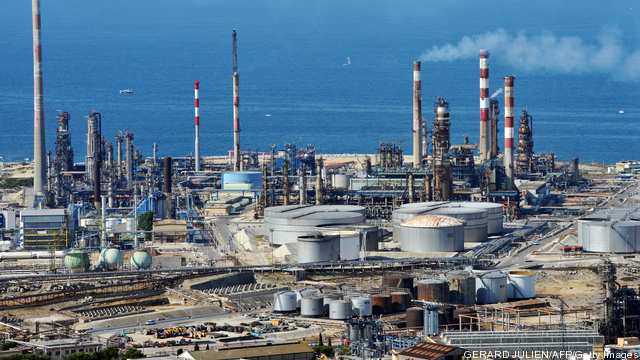The energy business – particularly the oil & gas sector – is one of the most global industries by virtue of the need to go where the resources are located. This makes national borders arbitrary and leads companies to invest billions of dollars in jurisdictions with high levels of above-ground risk. In their 2013 Fraud… Keep reading →
International
Sign up and get Breaking Energy news in your inbox.
We will never sell or share your information without your consent. See our privacy policy.

Saudi Arabia’s oil minister said on Tuesday he welcomes the new U.S. energy supplies as he expects the country to remain an importer of crude from the Middle East.
The United States is producing oil at the highest level in 20 years thanks to hydraulic fracturing and other advanced drilling techniques. “The United States is and will remain a major energy consumer,” Ali al-Naimi said at a speech at the Center for Strategic and International Studies in Washington.
“Talk of energy independence fails to recognize the interconnected nature of international energy markets. I believe this talk of ending reliance is a naive a rather simplistic view,” he said.
Published April 30, 2013 / Reuters
(Reporting by Timothy Gardner; Editing by Gerald E. McCormick)

Range Resources’ position in the Marcellus, and the market access it offers, gives the a leg up over condensate producers in other parts of the country, according to the company’s Senior Vice-President Rodney Waller.
Range holds a million acres in the Pennsylvania portion of the Marcellus shale some in dry gas areas, and some in wet gas or “super rich,” where the production stream yields liquids, such as condensate and NGLs. Range Chief Executive Jeff Ventura noted earlier this year that in 2012, the company’s Marcellus wet gas acreage was producing 49% liquids, compared to 57% in the super rich area. Keep reading →

Oil & gas giant ExxonMobil’s first quarter 2013 earnings announced today were up $50 million from first quarter 2012, but oil-equivalent production volumes decreased 3.5%. While upstream and downstream earnings were lower, the chemical division reported strong results, which helped balance the company’s overall financial and operational position.
“Upstream earnings were $7,037 million in the first quarter of 2013, down $765 million from the first quarter of 2012. Lower liquids realizations, partially offset by improved natural gas realizations, decreased earnings by $230 million,” the company said in a statement. Keep reading →

While LNG exports from the US are hotly debated, major shale gas player Range Resources was recently excited to proclaim it will be the first company to export natural gas liquids via ship from the US. Range has an agreement in place to begin ethane shipments to a petrochemical concern in Norway beginning in 2015.
We have a sales VP in Europe now – they [NGL sales team] got a call from China and there’s interest in Pittsburgh,” Rodney Waller, Range Senior Vice President said at the Independent Petroleum Association of America’s Oil & Gas Investment Symposium held last week in New York. Keep reading →

Oil prices have cascaded lower in the global commodities rout and may still have further to go before finding a floor, analysts say.
Government data showing weakening gasoline demand added to the selling pressure Wednesday, as did a stronger dollar, up 1 percent against a basket of currencies. West Texas Intermediate fell 2.3 percent to $86.68 a barrel, a fresh 2013 low, and Brent, the international benchmark, hit $97.80, a 2.1 percent decline. Keep reading →

North Sea Brent crude oil futures were lower for a fifth day on Tuesday, trading at a nine-month low below $100 a barrel.
U.S. benchmark crude, down for a fourth day, was at its lowest level so far in 2013, as the market remained under pressure from signs of weak oil demand growth. Keep reading →

Low natural gas prices in North America have prompted many oil and gas companies to jettison their dry gas assets, Fort Worth-based Quicksilver is capitalizing on Asian buyers’ efforts to secure lower-cost LNG feedstock to attract joint venture partners for its acreage in areas like the Horn River and Barnett shales.
Quicksilver is in negotiations for a joint venture partner in its Horn River Basin acreage in Canada. The company appears to be favoring an Asian buyer with an eye to exporting natural gas across the Pacific. Keep reading →

Papua New Guinea is set to join the global LNG game in 2014 when the ExxonMobil-led PNG LNG project is scheduled to ship its first deliveries, but a major announcement today by InterOil suggests an additional LNG export project could come on stream in the Asian Pacific island nation not long after.
InterOil has been active in PNG since the late 1990’s and operates the country’s only refinery which supplies about 65% of domestic refined product demand. Profits from InterOil’s downstream operations are often used to offset the costs of the company’s LNG export project, a major long-term strategic objective for the independent firm. Keep reading →

A reversal of fortunes is underway between major energy commodity markets, with global oil prices trending downward while US natural gas has been showing signs of life breaking above $4 per million Btu. In its latest Monthly Oil Market Report, the International Energy Agency discussed their view of why the recent weakening in global oil benchmark Brent futures prices might be “relatively short-lived.”
“By early April, frontâ€Âmonth Brent futures had tumbled to just shy of $104/bbl for the first time since midâ€ÂJune, and the backwardation on the Brent curve has eased,” the report said, but oil supply and refining capacity have been growing faster than demand. Backwardation is when prices in the distant future are lower than prompt month prices. Keep reading →

